ALUMNA SPOTLIGHT: SERVICE WITH IMPACT
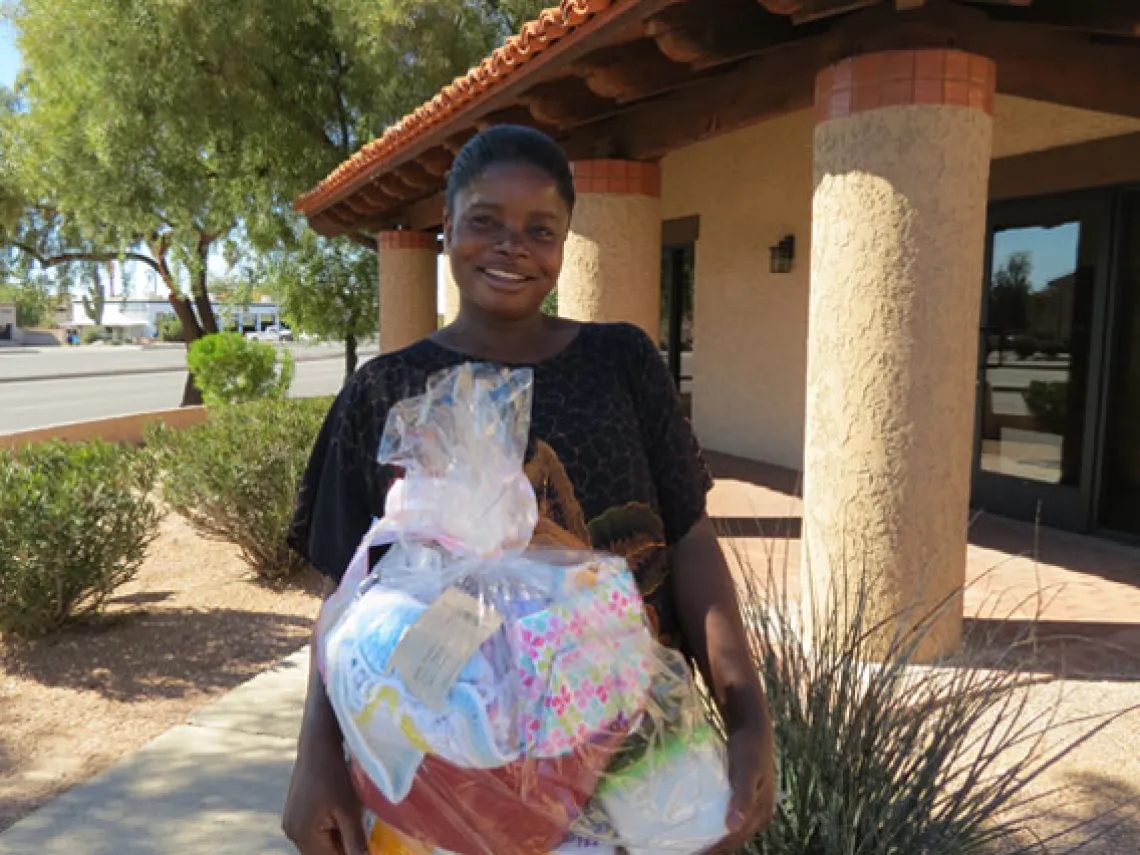
IRC client with post-natal gift.
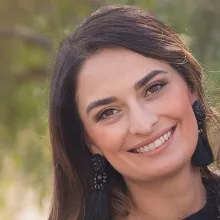
Lizbeth Vasquez-Gonzalez '10
Lizbeth Vasquez-Gonzalez is a former University of Arizona Public Health major who works with the International Rescue Committee overseeing health services and education campaigns for refugees in Tucson. She also has the distinction of being recognized as a 40 Under 40 awardee by the Tucson Hispanic Chamber of Commerce and the Arizona Daily Star for 2020.
Tell us about yourself?
I grew up on the US/Mexico border where economic and health disparities are highly visible yet separated from the United States by a militarized border affected by immigration policy, educational and social/economic factors. I started my work on the border by volunteering with No More Deaths providing life-saving support for migrants in the desert. During the unforgiving Arizona summers, volunteers from No More Deaths and I walked along identified migrant trails to leave water and provided first aid to migrants. I then became a liaison between the organization and the Mexican government to create the framework for an aid station for deported migrants on the Mexican border to provide medical care, information, food and water. Wanting to change how the border and immigration is perceived, I began working with Borderlinks, a nonprofit that seeks to educate university students from across the United States, as well as other American groups on immigration policy through educational tours of the area, to instigate a national conversation about immigration reform.
During my undergraduate career at the University of Arizona Honors College, I continued to work with marginalized populations on the border and designed my undergraduate studies to focus on international development in Latin America and public health with the help of my Honors mentor Wayne Decker. I culminated my studies with thesis work in Guatemala and Mexico, conducting field research and an education campaign on family planning for adolescent youth. I drew on my own cultural background to design the curriculum specifically for these communities. After graduation, I volunteered and worked in Tanzania with Support for International Change, coordinating HIV/AIDS education and organizing testing campaigns.
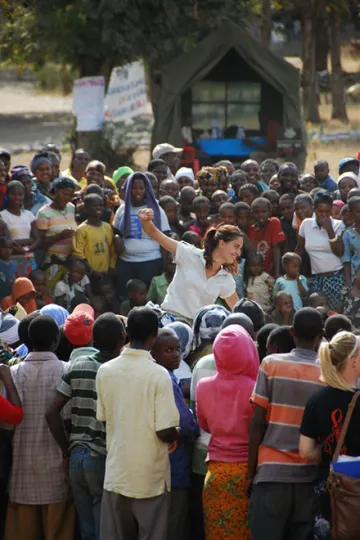
Testing site in Tanzania.
I began my work with refugees in a domestic setting after returning from Tanzania with Iskashitaa Refugee Network and now with the International Rescue Committee (IRC). In my current role, I oversee the provision of health services, care coordination, intensive case management and health education campaigns for refugees in Tucson. The IRC Health Program creates individualized service plans with clients to set goals to overcome their barriers towards resettlement including how to access services and navigate the US medical system. During my time at IRC, supplementary programs were created by partnering with the UArizona College of Pharmacy to provide medication adherence workshops and with the UArizona Global Studies and Public Health programs to offer Medical Advocacy Internships to undergraduate and master’s level interns. I continued my studies by completing a Masters in Humanitarian Health from Johns Hopkins Bloomberg School of Public Health. I enjoy camping and hiking with my partner, Miguel, and my 6-year old daughter, Maya Michela.
In what ways has your Honors experience had an impact on your career path and who you are today?
The Honors College at the University of Arizona helped me set high expectations for myself. It also introduced me to a life-long faculty mentor, Wayne Decker. The Honors thesis prepared me to dedicate time and effort to a large project and prioritizing my time.
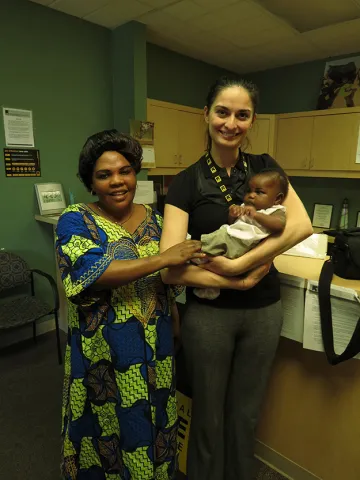
Client with baby at IRC pre-natal care.
What are you most passionate about in your work?
I am most passionate about connecting refugees with the healthcare they need and deserve and creating an opportunity for them to make their own health choices to reduce the burden of disease.
One such example can be highlighted: Client A was originally from the Democratic Republic of Congo. We built rapport with my limited Swahili skills while conversing about ugali (a maize stable in the East African diet) and mboga (vegetables). After multiple one-on-one sessions regarding nutrition and diet with Client A, she disclosed the details of her perilous journey through Africa to find safe haven. She fled her home country after her entire village was destroyed by a rebel group, killing most of her family. After a strenuous journey and witnessing the rape and murder of her sister, she sought refuge at a refugee camp in Tanzania not too far from where I lived a few years before. She lived in this refugee camp for a total of 7 years, all the while feeling light-headed, tired, and suffering from symptoms of PTSD. She was never screened for mental health symptoms and was diagnosed with diabetes on her medical exam 6 months prior to her resettlement to the United States. She was never diagnosed prior to this date, given information about her illness nor education on how to manage her blood sugar level with diet. Her increased burden of disease has been lowered since IRC’s health program has assisted her with accessing proper medical and mental health services and provided culturally and linguistically appropriate health education. She is now working and enjoys living in Tucson with the rest of her family.
Who or what has been your biggest inspiration?
Throughout my life I witnessed how poverty and humanitarian disasters create health disparities in communities. This has driven me to dedicate my career and life in advocating for increasing health outcomes and to better understand and mitigate the key determinants of health among displaced and marginalized populations.
How has this last year affected you and the work you do as a health program manager?
The COVID-19 pandemic forced our health program to change focus to address this new health concern. The health team actively reached out to refugee clients with conditions that would make them vulnerable to a severe COVID-19 infection and provided care coordination support. We also created health education materials in 7 languages and started a health education campaign to ensure people knew how to protect themselves and their families. IRC’s health education materials for social distancing and facemask use are linked on the CDC’s website and are now used nationally for limited-English proficient individuals. In addition, the IRC Health Program was awarded a $400K grant from the Arizona Health Department to partner with the Pima County Health Department to increase access to testing, health education and provide case management for communities of color in Pima County.
What has been your greatest challenge?
2020 has been an eventful year: my largest but most fulfilling challenge is juggling life during graduate school at Johns Hopkins Bloomberg School of Public Health during a pandemic: full-time work, full-time mom, graduate school, trying to make time for self-care, and full-time home schooling/childcare – all of which would have been impossible without the support and help of my partner, Miguel Vazquez.
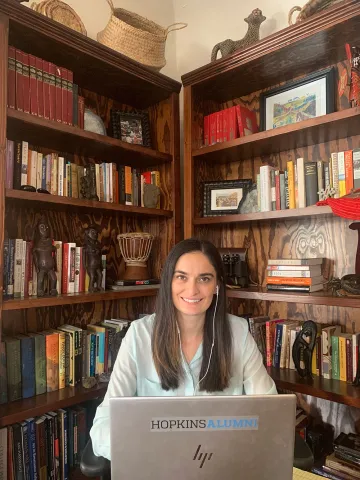
Gonzalez attending the North American Refugee Health Conference.
What advice do you have for students interested in your field?
Volunteer and intern in the field you are interested in. Absorb your experience and constantly ask yourself “How can I make this better? What institutional change must occur for this to work?” then set your mind in improving said solution.
How does it feel to be recognized as a 40 Under 40 awardee by the Tucson Hispanic Chamber of Commerce and the Arizona Daily Star? What does being a leader mean to you?
I am truly honored and humbled to be recognized as a 40 under 40 awardee along with other leaders in the community. A leader for me is someone that leads by example and empowers individuals to perform to the best of their ability.
What’s next for you?
This year’s focus for me is to develop a robust COVID-19 health program that will serve refugees and communities of color in Pima County that can be implemented in other counties/states and locations. My family is also planning to welcome a new Vazquez-Gonzalez member to the family in April 2021!
Any final words of wisdom for our future Wildcats?
Enjoy your undergraduate experience, and learn from your professors, your peers and yourself!

